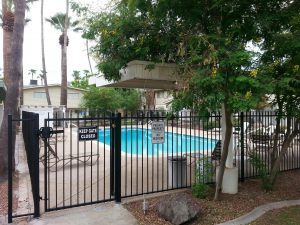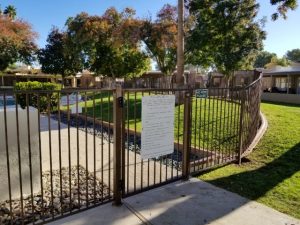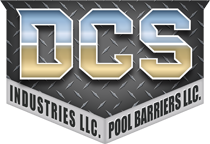How Apartment Complex Owners and Managers Can Improve Pool Safety
 Owners and managers of apartment complexes face the constant need to create a welcoming, homey environment for residents—while also maintaining order and safety. For communities with pool areas, safety must be a particularly high priority, as apartment pools tend to receive a significant number of visitors of all ages and swimming abilities. Taking certain precautions, such as ensuring that the apartment complex has proper pool barriers, will reduce the risk of injuries and accidents, thereby minimizing the property owner’s exposure to liability.
Owners and managers of apartment complexes face the constant need to create a welcoming, homey environment for residents—while also maintaining order and safety. For communities with pool areas, safety must be a particularly high priority, as apartment pools tend to receive a significant number of visitors of all ages and swimming abilities. Taking certain precautions, such as ensuring that the apartment complex has proper pool barriers, will reduce the risk of injuries and accidents, thereby minimizing the property owner’s exposure to liability.
Here are a few crucial steps that apartment complex owners and property managers should take in order to improve pool safety:
-
- Ensure that the pool area is completely enclosed by legally compliant fences and gates. In an effort to lower the state’s tragically high rate of drownings, Arizona imposes certain requirements on pool fences and gates. For example, fences must be at least five feet high and free of any gaps, handholds, or footholds that could be used to gain unauthorized access to the pool area. Gates must be self-closing and self-latching, open outwards from the pool, and have latching mechanisms located at least 54 inches above the ground. In addition to these requirements, some cities and towns have their own regulations governing pool barriers. One of the first steps that apartment landlords should take to improve pool safety is to review all applicable regulations and ensure that the fences and gates surrounding their property’s pool areas are in compliance. Keep in mind that guests of residents—and even trespassers who are not authorized to use the pool—could potentially sue the property owner in the event of an accident, so it is in the landlord’s financial best interest to make sure that proper pool barriers are in place.
- Check pool barriers regularly to ensure that they are in sound operating condition. Simply having pool fences and gates is not enough to guarantee that no one will access the pool area without permission—these fixtures must be inspected on a regular basis to verify that they are functioning properly. For example, rusted fences or gates that are not latching properly could create just as much of a hazard as not having any pool barriers at all. If fences or gates exhibit signs of deterioration, check with a professional—such as the team at DCS Pool Barriers—to determine if they can be repaired, or if replacement is necessary.
- Establish clear rules for using the pool area, and ensure that property managers and all residents are familiar with them. To reduce the risk of drowning, rules should prohibit children under 18 from using the pool without supervision, and should caution anyone against propping open gates. A copy of these rules should be given to all residents, and a sign enumerating them should be posted in the pool area and on community bulletin boards.
- Regularly test the pool’s chemical levels and filtration system. As a general rule, a pool’s pH levels should fall between 7.2 and 7.4, alkalinity should range from 80 to 120, and calcium hardness should be between 150ppm and 250ppm. When these levels are out of range, algae and other organisms may begin to grow in the pool water—which could create an eyesore and pose a health hazard to swimmers.
- Keep the landscaping surrounding the pool trimmed and tidy. Foliage can help to create a lush aesthetic in the pool area, but—particularly when it comes to prickly desert plants—it is important to keep it far enough away from where people will be walking barefoot. Plants’ thorns can lead to painful encounters for swimmers and puncture inflatable pool toys.
 Wondering whether your apartment complex’s pool area is an oasis, or an accident waiting to happen? With over 16 years of experience working with apartment communities and all other types of properties, the DCS Pool Barriers team will make sure that your pool fences and gates are compliant with state and local law and functioning properly in order to minimize the risk of drowning. If you are in need of new pool barriers, we can design, manufacture, and install premium-quality wrought iron fences and gates that complement the style of your property. Wrought iron is a favored material for pool barriers because it is sturdy, stylish, and more resistant to rust than alternative materials—ensuring that it will stay in prime condition for years to come and deliver a positive return on investment. Contact DCS Pool Barriers today at 623-825-7700 to request a free estimate!
Wondering whether your apartment complex’s pool area is an oasis, or an accident waiting to happen? With over 16 years of experience working with apartment communities and all other types of properties, the DCS Pool Barriers team will make sure that your pool fences and gates are compliant with state and local law and functioning properly in order to minimize the risk of drowning. If you are in need of new pool barriers, we can design, manufacture, and install premium-quality wrought iron fences and gates that complement the style of your property. Wrought iron is a favored material for pool barriers because it is sturdy, stylish, and more resistant to rust than alternative materials—ensuring that it will stay in prime condition for years to come and deliver a positive return on investment. Contact DCS Pool Barriers today at 623-825-7700 to request a free estimate!
(Sources: https://www.landlordology.com/swimming-pool-maintenance-liability/, https://www.propertymanagerinsider.com/apartment-complex-pool-safety-tips/).
